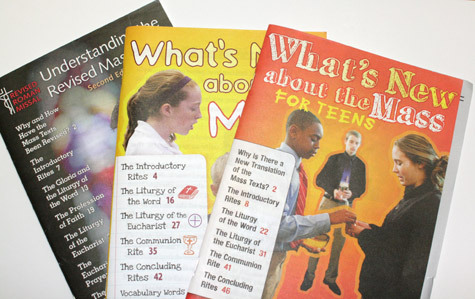Severity: Warning
Message: getimagesize(https://www.arkansas-catholic.org/photos/2692/oyh_missal_pic.jpg ): failed to open stream: HTTP request failed! HTTP/1.1 400 Bad Request
Filename: views/ac.php
Line Number: 295

The third edition of the Roman Missal will not be introduced at English-language Masses until Masses Nov. 26-27, but Catholics will begin to see and hear more this fall about what to expect.
Msgr. Richard Oswald, director of the Office of Divine Worship, said priests, principals and deacons were introduced to the changes in the spring and summer. This fall he will be speaking to the directors of religious education. He expects the teachers and catechists to also be getting formation. Pastors and parish staffs will then be offering adult religious education programs in September, October and November about the changes in the Mass prayers.
He is also encouraging parishes to offer written materials and bulletin inserts to the laity before Nov. 27 and supply "pew cards" during Mass after the implementation in Advent. Several Catholic publishers are providing reusable pew cards to guide laypeople on new prayers.
 "There is not one specific approach we are recommending," Msgr. Oswald said of informing the laity.
"There is not one specific approach we are recommending," Msgr. Oswald said of informing the laity.
"I hope all parishes have ordered copies of the Third Edition of the Roman Missal," which was formerly called the sacramentary and used by the priest at the altar and presider's chair. The missal contains the instructions for the priest and congregation during Mass.
Msgr. Oswald said the new translation will be an opportunity to learn more about the Mass.
"We also see this as an opportunity to go back and learn a deeper appreciation of the Eucharist," he said. "There are many parishes doing studies of the Mass this fall to help people deepen their appreciation of the Mass and how they participate."
While most prayers for the priests and laity cannot be introduced until the first Sunday in Advent, the people's parts that are sung can be introduced starting this month.
The U.S. bishops decided this summer to allow dioceses to introduce to parishioners the various parts of the new translation that the laity sing. This primarily includes the Gloria, Holy, Holy, Holy and the memorial acclamations.
Msgr. Oswald said it is particularly important to introduce the Gloria before Advent begins because during Advent it is not sung. If the Gloria was not practiced this fall, the first time the people would hear it again would be at Christmas Mass, he said.
Mass prayer changes for Spanish-speaking Catholics will not be introduced yet. Father Richard Hilgartner, associate director of the U.S. bishops' Secretariat on Divine Worship, said the Mexican bishops' conference is still awaiting approval from the Vatican for its translation of the Latin text of the missal. Once the Mexican text is approved, the U.S. bishops might publish a Spanish-language edition based on that translation.
Because most of the changes in the prayers are with the priests' parts, Msgr. Oswald said he is not expecting a lot of problems for those in the pews.
"I think the people will, with a little instruction from their pastor, be open to it and to grow in understanding of it. The main thing about the new translation is it is more faithful to the Latin original. This is not a new missal. This is the same missal that has been with us in Latin since 1975. This is a new translation of that missal. The language will be somewhat more formal, somewhat more elevated. Many people will see it as a more formal prayer language. I hope that will help people to see that what we are doing during the Mass is something very special. When we pray at Mass, maybe it deserves a more formal, more sacred style of language."
Bishop Taylor's video and audio recordings in English and Spanish, and many other resources: www.dolr.org/bishop/openhearts.php.
Please read our Comments Policy before posting.
Article comments powered by Disqus 'Cabrini' film tells story of saint with great faith
'Cabrini' film tells story of saint with great faith
 Bishop Taylor announces more pastoral appointments
Bishop Taylor announces more pastoral appointments
 Most U.S. Catholics approve of Pope Francis, Pew says
Most U.S. Catholics approve of Pope Francis, Pew says
 Winning directory photo honors Our Lady of Guadalupe
Winning directory photo honors Our Lady of Guadalupe
 St. Joseph a model of solidarity with immigrants
St. Joseph a model of solidarity with immigrants
 Two gifts after Jesus’ death: Virgin Mary and Eucharist
Two gifts after Jesus’ death: Virgin Mary and Eucharist
 Why we have an altar, and not just a communion table
Why we have an altar, and not just a communion table
 Pope: Wars should be resolved through nonviolence
Pope: Wars should be resolved through nonviolence
 Living relationship with Jesus Christ in the Eucharist
Living relationship with Jesus Christ in the Eucharist